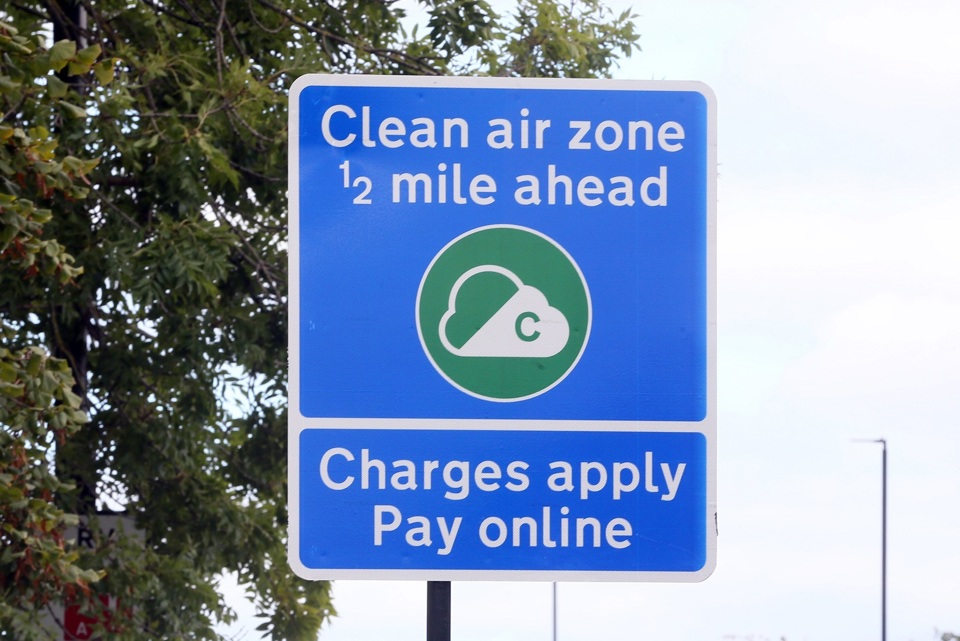Fleets and their drivers will not face additional charges to drive into Greater Manchester after a charging clean air zone (CAZ) was ruled out, the Government has confirmed.
The area is set to benefit instead from 117 new lower and zero-emission buses in a £86 million scheme to help clean up the region’s air.
Defra and the Department for Transport (DfT) have assessed an investment-led plan proposed by local councils and concluded it will meet legal obligations to reduce nitrogen dioxide pollution.
The Road Haulage Association (RHA) welcomed the move. “Tackling poor air quality must be a priority and we fully support that ambition,” said Chris Ashley, RHA senior policy lead.
“We’ve consistently campaigned for measures to support investment in cleaner vehicles and improve existing infrastructure, so we’re pleased that the Government and Greater Manchester is going ahead this way. This is a welcome boost to businesses struggling with soaring costs who operate there.
“We continue to call for existing charging clean air zones elsewhere to be closed down once legal air quality targets are met.”
While local authorities in other areas have found that a clean air zone is the best route to cutting nitrogen dioxide pollution, Greater Manchester provided evidence they can achieve compliance with legal limits faster without charging.
Air quality minister Emma Hardy said: “Air pollution is damaging people’s health and the environment. Its impacts are felt more by low-income communities, making health and social inequalities worse.
“To improve our health, wellbeing and the environment, we must improve air quality.
“Local authorities know their communities well and so they need to develop plans that are most effective for their local area, and I am pleased that Greater Manchester has found a clear way to reduce emissions without the need to charge motorists.
“I look forward to working with the teams across Greater Manchester as they put this important plan in place. Government will continue to take the action needed to ensure everyone has safe air to breathe across the nation.”
In addition to the fleet of new buses, traffic-calming measures will be introduced to improve air quality in the region.
The investment-led package includes: £51.1m towards bus investment, including 40 zero emission buses, 77 Euro VI standard buses and charging infrastructure; £5m for local traffic management measures; £8 million to support moving Greater Manchester’s taxi fleet to cleaner vehicles; and up to £21.9m for administration, delivery, monitoring and other associated costs.
Transport minister Lilian Greenwood said: “Manchester will be able to reduce pollution from transport without having to charge motorists, and new, cleaner buses will help Mancunians get around easily while still bringing down emissions across the city.
“We will continue to work with local leaders to create better connected communities, meet our climate targets and make Britain a clean energy superpower as part of our Plan for Change.”
Greater Manchester Combined Authority (GMCA) and the Government announced that Manchester's CAZ had been put on hold to find a solution that was fairer to local businesses and residents in 2022.
A ‘Category C’ charging clean air zone (CAZ) covering Greater Manchester was due to be launched from May 30, 2022, and would operate seven days a week, 24 hours a day.
Non-compliant coaches and HGVs were due to be charged £60 to enter the zone, and taxis and private hire vehicles £7.50, with a temporary exemption for Greater Manchester-licensed vehicles until May 31, 2023.
Older vans and minibuses would also get an exemption until the same date but would be charged £10 thereafter.
Mayor of Greater Manchester, Andy Burnham, said: “We are grateful to this Government for listening to Greater Manchester and for this vote of confidence in our investment-led approach to cleaning up our air. This is the right decision for Greater Manchester and it gives people here the certainty they have long needed.
“Because we have implemented the first phase of the Bee Network on time and on budget, the Government clearly trusts us to deliver and has seen the evidence that our approach is working.
“The Bee Network is cleaning up our air and keeping the cost of travel as low as possible. Its success is allowing us to remove a big weight of worry off the shoulders of people who need to drive as part of their job.
“We are grateful to Steve Reed and Heidi Alexander for backing us with funding to take our approach further and faster.
“We will now continue to work towards an all-electric bus fleet whilst investing in local traffic measures and supporting our GM-licensed taxi drivers to upgrade to cleaner vehicles.”
The UK has legally-binding targets to reduce the concentration of nitrogen dioxide in the air to an annual average of no more than 40 microgrammes per cubic metre.
It is the role of local councils to determine the quickest and most effective way to do that.
As part of its nitrogen dioxide programme, the Government works with local authorities to ensure proposed plans address nitrogen dioxide pollution in the shortest time possible, delivering better environmental outcomes for residents.





















Login to comment
Comments
No comments have been made yet.